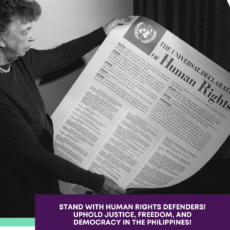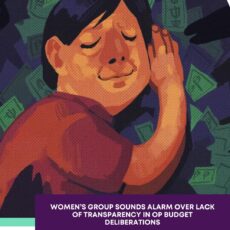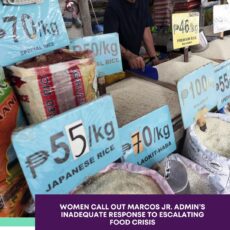The Center for Women’s Resources (CWR) supports the proposed legislative measures aimed at increasing women’s participation in political parties (House Bill No. 6604 and House Bill No. 9667). This proposed measure is of critical importance and represents a stride towards empowering women within the political sphere, aligning with principles enshrined in international human rights frameworks.
The right of women to participate in public and political life, including their representation, is vital for fully realizing their role as agents of change and beneficiaries of sustainable development and progress. The meaningful involvement of women in public life is crucial to ensure the integration of their concerns and perspectives in decision-making processes and policy formulation.
Examining the current landscape of women’s political participation in the Philippines reveals a modest increase in women’s representation in elected positions, with the proportion of female elected officials rising from 22% in 2016 to 31% in 2022. Despite an 8.47% increase in the number of women elected officials between the 2016 and 2022 National and Local Elections, the overall proportion fell short of the envisioned 50-50 distribution in decision making positions.
While legal impediments to women’s political representation do not exist, and despite the enactment of the Magna Carta of Women, systemic and cultural barriers persist. The slow growth in women’s political representation is attributed to various challenges, including persistent patriarchal norms and gender stereotypes, domestic responsibilities, and inadequate training and education. Financial constraints and limited economic resources for political campaigns greatly impedes women’s ability to compete on an equal footing with male counterparts.
Instances of violence against women in politics remain a significant concern. Women candidates and politicians face threats, harassment, and discrimination, creating a hostile environment that discourages many from active political engagement. For instance, the Gabriela Women’s Party, the lone women’s political party and sectoral representation in the Philippine Congress, faces ongoing disqualification cases filed by the National Task Force to End Local Communist Armed Conflict (NTF-ELCAC) with the Commission on Elections. This troubling trend underscores the urgency of addressing not only the barriers to women’s political participation but also the systemic harassment and intimidation they encounter in the pursuit of their political roles.
In this light, the Center for Women’s Resources (CWR) supports the provisions of the proposed legislative measure to increase women’s participation in political parties and recommends the following:
- On supporting women quota, CWR emphasizes the importance of prioritizing women from marginalized sectors in the implementation of the Women Participation and Representation in Political Parties Act. Women from the marginalized sectors of workers, farmers, migrants, indigenous peoples, possess a unique understanding of the challenges faced by their communities, and this will ensure that policies are not only inclusive but also responsive to their specific needs.
- On Women and Gender and Development Agenda and Program, CWR notes that political parties must integrate gender perspectives and women’s human rights into their core philosophy and ideas. The Women and Gender and Development Agenda and Program must give emphasis to addressing pressing issues of women, including economic security, access and control over resources, access to health and education, and addressing gender based violence, among others.
- On establishing the Women in Political Parties Empowerment Fund, CWR supports the creation of the financing of the Women and Gender and Development Agenda and augmenting campaign expenditures for women candidates. However, mechanisms should be in place to ensure that the funds will be used by women candidates from marginalized sectors who have limited access to resources.
- CWR underscores the need to strengthen mechanisms to ensure a safe and enabling environment for women’s political participation and safeguard them from potential risks. This will ensure a robust and fearless representation that is essential for promoting genuine democracy. There must be mechanisms to prevent discrimination and hate speech against women politicians and women candidates in political and public discourse. Concrete steps must be taken to prevent harassment and threats against women candidates and politicians.
These recommendations aim not only to rectify the current gender imbalances in the political sphere but also to pave the way for a truly inclusive and democratic political landscape. The Center for Women’s Resources remains steadfast in its dedication to supporting the full participation of women, especially those in the marginalized sectors, in the political sphere.



